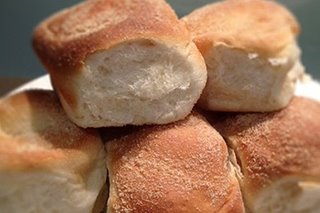[7.25] 필리핀 빵집들, 인플레이션이 물면서 '가난한 사람의 빵' 축소합니다.
컨텐츠 정보
- 17,553 조회
본문
마닐라 - 우크라이나 전쟁으로 밀 가격이 오르고 페소화 약세가 수입 식용유 가격을 인상함에 따라, 많은 필리핀 제빵사들은 높은 인플레이션에 대처하기 위해 인기 있는 아침 롤의 크기를 줄이고 있습니다.
필리핀 사람들이 커피나 치즈와 함께 자주 적시는 약간 달고 베개 같은 부드러운 "판데살"은 마닐라 교외의 빵 제조사인 마티미아스 베이커리에서 무게가 35g이 나곤 했습니다.
하지만 최근 몇 달 동안 현지와 수입 재료들의 가격이 치솟자, 공동 소유자인 잼 마울레온은 2.50 페소 (약 0.04달러)의 가격 인상을 피하기 위해, 값이 싸기 때문에 "가난한 사람들의 빵"으로 알려진 롤의 크기를 점차적으로 25그램으로 줄였습니다.
그녀는 조금만 인상해도 이웃에 있는 돈에 쪼들리는 손님들을 다섯 블록 떨어진 경쟁 빵집으로 보낼까 봐 걱정했습니다.
"우리는 살아남기 위해 서빙 크기를 줄여야만 했습니다,"라고 마울레온은 AFP에 말했는데, 그날 아침 어린이, 근로자, 은퇴자들이 벽돌 오븐에서 구운 롤을 사기 위해 일찍 도착했기 때문입니다.
필리핀이 코로나19 규제를 철폐하고 학생들이 올해 교실로 돌아오기 시작하면서, Maulleon은 빵집의 경제적 조건이 개선되기를 희망했습니다.
하지만 12월 이후 밀과 연료 가격이 급등하면서 밀가루 가격이 30% 이상 오른 반면 설탕은 25%, 소금은 40% 더 비싸졌다고 그녀는 말했습니다.
그 빵집은 하루하루 살아남아 재료를 대량으로 살 만큼 충분한 돈을 벌지 못해 국내외 시장의 가격 변화에 취약합니다.
직원 수를 줄이고 더 높은 비용을 흡수한 후, Maulleon은 이번 주에 판데일 가격을 3페소로 20% 인상해야 했습니다.
롤의 크기를 더 줄이는 것은 롤의 품질에 영향을 미칠 것이라고 그녀는 말했습니다.
"사람들이 여전히 그것을 살 수 있다면 우리는 그것을 시험해 볼 것입니다,"라고 Maulleon은 말했습니다.
"판데살은 필리핀 사람들의 삶에서 매우 중요합니다."
다섯 아이를 가진 라르니 과리노의 경우, 가격 인상은 그녀의 가족이 이제 아침 식사로 더 적은 롤을 먹는다는 것을 의미합니다.
"우리는 예산을 다시 짜야 할 것입니다. 각각 다섯 조각씩, 제 아이들은 서너 개만 먹어야 합니다," 라고 35세의 과리노가 AFP에 말했습니다.
"50 센타보는 우리 같은 가난한 사람들에게 큰 일입니다."
'수축 인플레이션'입니다.
지역 빵집을 대표하는 협회의 회장 루시토 차베스는 수천 명의 빵 제조업자들이 원자재 가격 인상으로 휘청거리고 있다고 말했습니다. 대부분은 수입품입니다.
"우리 모두는 이익을 얻기 위해서가 아니라 생존하기 위해 고군분투하고 있습니다,"라고 차베스는 AFP통신에 말했습니다.
"우리는 팬데일 산업을 보호해야 합니다."
필리핀의 6월 인플레이션은 급격한 연료 가격 상승으로 식량과 운송 비용이 상승하면서 거의 4년 만에 가장 높은 수준인 6.1 퍼센트를 기록했습니다.
국회의원 겸 경제학자 조이 살세다는 빵이 제품의 크기는 작아지지만 가격은 그대로 유지되는 "수축 인플레이션"에 의해 가장 큰 타격을 받을 것이라고 말했습니다.
"밀 가격이 165% 인상되었습니다,"라고 그는 최근 기자들에게 말하면서 제과점들에게 비타민과 미네랄로 그들의 제품을 강화하라고 촉구했습니다.
This is the Original Article from ABS-CBN NEWS
MANILA - As the war in Ukraine pushes up wheat prices and a weaker peso raises the cost of imported edible oil, many Philippine bakers are shrinking the size of a popular breakfast roll to cope with higher inflation.
The slightly sweet and pillowy soft "pandesal", which Filipinos often dunk in coffee or stuff with cheese, used to weigh 35 grams at Matimyas Bakery, a breadmaker in suburban Manila.
But as the cost of local and imported ingredients soared in recent months, co-owner Jam Mauleon gradually reduced the size of the roll -- known as the "poor man's bread" because it is cheap -- to around 25 grams to avoid raising the 2.50 peso (about $0.04) price.
She feared that even a slight increase would send cash-strapped customers in her neighborhood to a rival bakery five blocks away.
"We had to reduce the serving size to survive," Mauleon told AFP, as children, workers and retirees arrived early to buy rolls baked in a brick oven that morning.
As the Philippines lifted Covid-19 restrictions and schoolchildren began returning to the classroom this year, Mauleon had hoped economic conditions for the bakery would improve.
But since December, as wheat and fuel prices surged, the price of flour has increased by more than 30 percent, while sugar is up 25 percent and salt costs 40 percent more, she said.
The bakery survives day to day and does not make enough money to buy ingredients in bulk, leaving it vulnerable to changing prices in domestic and international markets.
After reducing the number of employees and absorbing higher costs, Mauleon was forced this week to raise the price of a pandesal by 20 percent to three pesos.
Shrinking the size of the roll any further would affect its quality, she said.
"We will try it out if people will still buy it," Mauleon said.
"Pandesal is very important in the lives of Filipinos."
For mother-of-five Laarni Guarino, the price hike means her family now eats fewer rolls for breakfast.
"We will have to redo our budget. From five pieces each, my children will have to eat just three to four," Guarino, 35, told AFP.
"Fifty centavos is a big thing for poor people like us."
'SHRINKFLATION'
Lucito Chavez, president of an association representing local bakeries, said thousands of bread makers were reeling from the higher cost for raw materials, most of which are imported.
"All of us are struggling, not to make profit, but to survive," Chavez told AFP.
"We have to protect the pandesal industry."
Inflation in the Philippines hit 6.1 percent in June, the highest level in nearly four years, as steep fuel price hikes pushed up food and transport costs.
Lawmaker and economist Joey Salceda said bread would be hardest hit by "shrinkflation", where the size of a product gets smaller but the price stays the same.
"Wheat prices have increased by 165 percent," he told reporters recently, urging bakeries to fortify their products with vitamins and minerals.
관련자료
-
이전
-
다음


